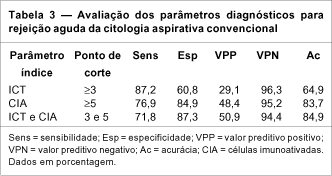OBJECTIVE: To evaluate the utility of kidney aspiration cytology in the sequential monitorization of acute rejection in renal transplant patients. PATIENTS AND METHODS: Thirty patients were submitted to 376 aspirations. The clinical diagnoses were independently established. RESULTS: The representativity of the samples reached 82.7%. The total corrected increment index and the number of immunoactivated cells were higher during acute rejection as compared to normal allograft function, acute tubular necrosis, and cyclosporine nephrotoxicity. The parameters to the diagnosis of acute rejection were: sensitivity: 71.8%, specificity: 87.3%, positive predictive value: 50.9%, negative predictive value: 94.9% and accuracy 84.9%. The false positive results were mainly related to cytomegalovirus infection or to the administration of OKT3. In 10 out of 11 false negative results incipient immunoactivation was present alerting to the possibility of acute rejection. CONCLUSIONS: Kidney aspiration cytology is a useful tool for the sequential monitorization of acute rejection in renal transplant patients. The best results are reached when the results of aspiration cytology are analyzed with the clinical data.
Renal transplantation; Acute rejection; Aspiration cytology



